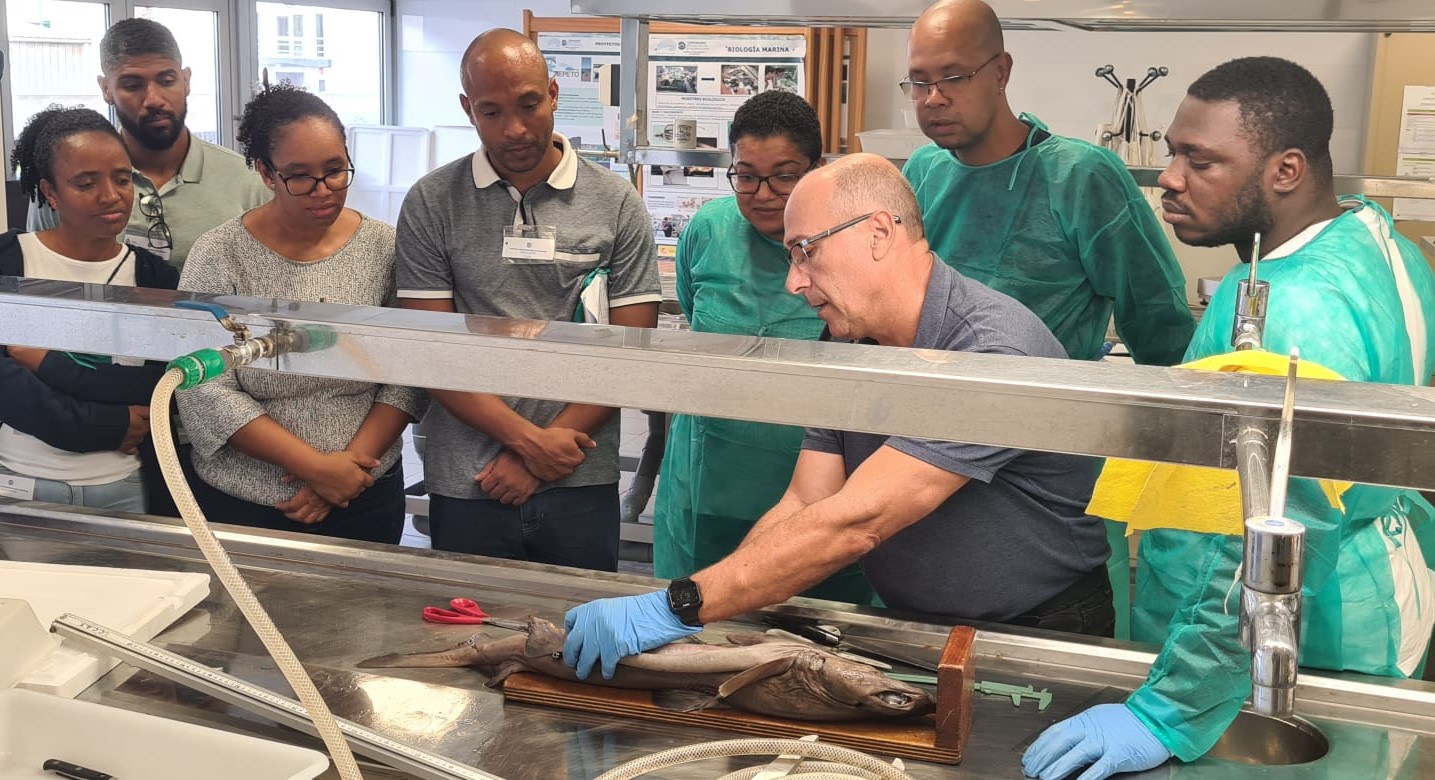Fish taxonomy research workshop develops local talent and leadership in Tenerife

16-20 January 2023, Tenerife, Spain – Seven scientists participated in the first fish taxonomy research workshop organized by the EAF-Nansen Programme in collaboration with the Spanish Institute of Oceanography in Tenerife (IEO). For 5 days, workshop participants were guided through standard procedures and routines in fish taxonomy, preparing them to produce their own scientific research.
“It was inspiring to see their passion and commitment to taxonomy,” said FAO fish taxonomist Dr Peter Psomadakis who led the workshop that was designed to build and develop local talent and leadership. “In time, they will be less reliant on outside expertise.”
Capacity development is a key element of the EAF-Nansen Programme, and basic taxonomy courses are routinely organized to recognize the importance of correct species identification for fishery and environmental research, and management.
At the training in Tenerife, dedicated lectures, preparatory exercises, instructions and introductory sessions were combined with practical work using relevant fish specimens that were collected by the research vessel Dr Fridtjof Nansen during an ecosystem survey in Cabo Verde waters in 2021. A survey that six of the participants took part in.
“The workshop had a good balance of theory and practical training, and the interactions between trainers and trainees was great. They had come up with ideas to help us understand the subject and its goals and establish a clear work methodology for the practical components”, said Nuno Víeíra, a scientist from Instituto do Mar in Mindelo, Cabo Verde, who participated in the workshop alongside five other scientists from Cabo Verde, and one from Guinea Bissau. Alciany da Luz, also from Instituto do Mar, agreed and both noted that the workshop was an opportunity to deepen the work that was started aboard the research vessel. “While working on the species collected during the Cabo Verde survey, important taxonomic details were revealed and the practical training allowed us to improve our skills in species identification.”
Among the taxa selected for the workshop the most relevant was a snake eel specimen that could not be assimilated to any other known species to date. After a detailed morphological study and comparison with closely related species, it was decided that the species was new to science and the participants proceeded with its formal description as part of the workshop activities.
The undescribed snake eel was a truly exciting finding according to Dr Psomadakis, who also confirmed that there were other discoveries that contributed to our understanding of the fish fauna in the area. “We found a snake eel Xyrias guineensis (Ophicththidae) and a deep-water wrasse Lappanella guineensis (Labridae) that had never been reported in Cabo Verde before, as well as a dragonet species Centrodraco oregonus (Draconettidae) previously known from off the Atlantic coast of Brazil only.”

PHOTOS: Post-survey Taxonomy Training, Tenerife
The deep-water shark Apristurus laurussonii and the Cabo Verde endemic sandperch, Parapercis atlantica were also selected for the workshop activities. While A. laurussonii represents a first record for Cabo Verde Archipelago, the Cape Verde sandperch is a rare deep-water species geographically restricted to Cabo Verde waters presently known only from a single specimen described in 1887. Both findings deserve publication and will be the object of two separate papers led by the workshop participants.
In addition to the classical morphological study, x-rays (for vertebrae count) and tissue samples (for genetic study) were obtained for all specimens used during the workshop activities.
At the end of the workshop, participants expressed great satisfaction with the organization of the workshop. In particular, the innovative approach that prepared them for the development of five manuscripts that will be submitted to scientific journals by the end of June 2023.
The course was organized in close collaboration with the IEO Centre in Tenerife and its director Dr Pedro Vélez. In addition to modern facilities with laboratories, lab equipment, lecture rooms and walk-in freezers, IEO provided a workshop trainer, Dr Pedro José Pascual Alayón who is a marine biologist with a long experience in systematics and biology of deep-sea sharks. José F. González Jimenéz, an experienced ichthyologist who carried out a preliminary taxonomic examination of the frozen material collected on the 2021 Nansen Cabo Verde survey, also contributed with his expertise. So did Dr Rui Freitas, a full-time professor at the Atlantic Technical University, Institute of Engineering and Sea Science, São Vicente, Cabo Verde whose research focuses on ecology, biodiversity and biogeography of the reef fish from Cabo Verde Islands. Pedro Martinez Martinez, a PhD student at IEO, also supported the participants and trainers during the workshop.
Given its successful results and the positive feedback, the Programme is planning to replicate the Tenerife workshop using data and specimens from other surveys to guide scientists from partner countries to produce their scientific research independently as well. “Our ultimate goal is to enhance the capacity of the Programme's partner countries, and we strive for them to lead their own research efforts – now and in the future, beyond the Programme", Peter Psomadakis concluded.
The EAF-Nansen Programme is a longstanding partnership between the Food and Agriculture Organization of the United Nations (FAO) and Norway, dating back to 1975. It is executed by FAO in close collaboration with the Norwegian Institute of Marine Research (IMR) and funded by the Norwegian Agency for Development Cooperation (Norad).
In collaboration with 32 countries across Africa and the Bay of Bengal, the Programme is improving fisheries policies and management practices in line with the ecosystem approach to fisheries (EAF), and developing the capacity of fisheries institutions to ensure sustainable fisheries management.
More on the topic:
